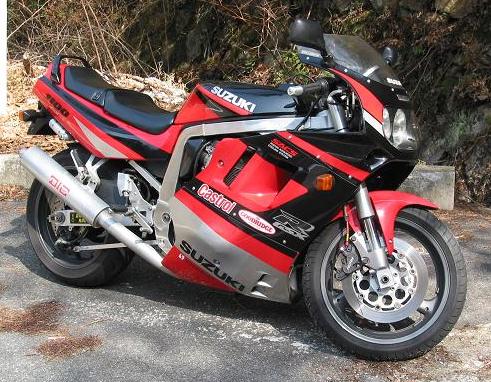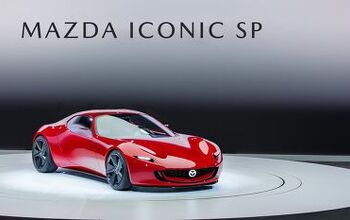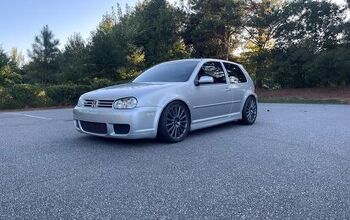Close Encounters of the Japanese Kind
At just 10:30 AM the sun was already near its full zenith and it beat down upon the city of Osaka with an intense, angry glare. Waves of heat shimmered up from the pavement and superheated the air which blew around in tepid, weak breezes that offered little respite. Perhaps later, the column of heat created by the great city’s many square miles of pavement would spark a sudden thunderstorm as it rose high into the stratosphere and the resultant rain would bring relief as it cascaded down and turned the streets into raging torrents. For now, however, there was only the glare of the sun, the stifling heat and, for me, the thought that riding an 1100 cc air cooled sport bike in a full set of leathers was a choice I should have avoided making.
The morning had begun as all summer mornings do in Japan, with the incessant shrieking of cicadas and the knowledge that sweltering heat and insufferable humidity were to follow. Regardless, my bike had sat unused for far too many days and I knew that if I failed to get the it out on the road I would regret my inaction later. To mitigate that future guilt, I decided I would make the trip across town to get a hot dog at Costco. My silly, trumped up excuse for action firmly fixed in my mind, I rolled my mighty GSXR from its hiding place under the stairwell of our apartment house, slipped into my familiar riding gear and set out.
It was still early enough that traffic was light and despite the big bike’s size, I weaved through traffic with relative ease, splitting lanes as needed but never really putting bike‘s full power to the ground. When it had been built back in 1991, my GSXR was as close to a street-going race bike as you could get. Regardless of that fact, its first owner had modified it to be even faster, adding larger carbs and a full stainless steel race exhaust that raised the bike’s horsepower well into the triple digits. It was loud, temperamental and, compared to the newer, fuel injected sport bikes made today, crude and it hated to be constricted by real world concerns like traffic laws and my own will to live. By the time I got close to my destination, the bike too was having trouble with the heat and was beginning to show signs of a fouled spark plug.
I rolled onto the wide boulevard that led the last half mile to my destination and pulled up at a stoplight. Ahead of me, the road stretched out wide and straight, three lanes wide in each direction and on its surface only the shimmering waves of heat rising from the pavement gave any indication of motion. The light turned green and I revved the bike, using the open road as an opportunity to raise the revs a bit higher into their range to tray and blast loose that bit of carbon that I knew was clinging to the electrode of at least one of my plugs. It was the city, however, and I stayed in the lower gears, letting off the gas and killing my acceleration just under of the speed limit. Ahead, the last two lights between me and my destination turned green in tandem and I held my speed.
Just then, out of the entrance to a blind alleyway, a bicyclist shot out into the main street. How he failed to hear me, I have no idea, but the distance between us negligible and a collision looked imminent. I laid on the horn and just as quickly clamped on the brakes. I squeezed down hard and the big Suzuki’s brakes bit deeply, unsettling the bike’s suspension and shifting the bike’s weight forward onto the front end, almost bottoming out the forks. With me baring down upon him, the bicyclist stopped dead in the road and right in my path – a deer in the headlights.
You learn to make choices fast on when you are on the back of a sport bike and years of experience had taught me my options were limited. There was no time to swerve, and a sudden pivot in any direction would leave me dumped on my side in the street. There was no swerving then, my best option, I decided, was straight ahead, right up and over that stoplight running SOB. It was going to be ugly.
I bore down on him like a freight train, my big bike’s dual headlights boring into his soul as I closed the gap, my horn blaring steadily. The distance closed to inches and then, a split second before impact, in an act of sheer desperation the bicyclist kicked forward with is foot and rolled just one foot forward. That movement saved us both and I slid past behind him with a bare inch to spare stopping about 5 feet beyond what would have been our point of impact. I turned my head, glared back at him over my shoulder and extended my arm palm up, giving him my best sign language version of “WTF?” With a downward motion of his hands and a slight bow, he placated me and, with the cars behind beginning to bare down upon us, we separated, him to his destination and me to mine.
The manual operation of the bike occupied my attention while I covered the remaining distance to Costco and parked, but once inside the store the entire experience hit me hard. It took some time to compose myself, it isn’t every day you almost kill someone, after all. After a brief period of adrenaline related butterflies in my stomach, I headed into the store and my mind was filling with the other possible courses of action I might have taken. Lost in deep thought, I approached the food court.
For whatever reason the line at the hotdog stand was huge. Hundreds of small dark haired women, many with children scuttling around their feet, waited patiently in long lines, each one taking a few extra moments to verify the complicated menu that listed so many odd, Western food options prior to making their order. The process took far too long, but it was OK, after the events of the morning waiting mindlessly in a long, slow moving line was rather cathartic. After many long minutes I found myself before the counter, made my order and scurried away to condiment table where I dressed my hotdogs and filled my cup with cold soda.
I turned towards the tables and found myself shocked at the site of a sea of sullen faced men, none with food in their hands, occupying virtually all of the tables as they waited for their wives who were lost somewhere in the mass of humanity lined up before the counter. There I stood, two dogs gripped in my right hand as it stuck through the chin bar of my full faced helmet, my leather riding jacket in the crook of my arm and my tank bag and a soda tenuously sharing the grip of my left. There was nowhere to sit, and I found myself flushed with sudden anger. This was typical.
Like a well practiced team, these men had rushed to the tables and staked out their places while their wives ordered and prepared their food, Meanwhile, no one else would be allowed to sit. I stalked into their midst staring them down and forcing them to turn and look away whenever they dared to glance in my direction. At last in the middle of this group I found a single table, a carefully folded jacket draped across one side of it. Frankly, I didn’t care anymore, chances are I would finish before the jacket‘s owner returned anyhow so I sat down and unloaded my food.
I unwrapped a dog and had only taken my first bite when they arrived. An elderly man, perhaps in his 70s, his small, silver haired wife, their daughter and grandson approached the table furtively and made to take the coat away. In their hands they each had a plate of food, a drink and I could tell when I made eye contact that, like me, they knew there was nowhere else to sit. I began to wrap my hotdog back up and rise, but the man bade me to sit and after a word with his wife the family sat down with me, the little man across from me, his wife to my right and the daughter across from her with their grandson on her lap. It was only mildly uncomfortable for us all and soon they were chatting away with one another about the most ordinary of subjects, carefully and politely avoiding the subject of the giant gorilla of a man who had stolen their spot. I finished quickly, gathered my trash and made to leave when the old man spoke to me for the first time.
“Are you an American?” He asked in English.
I paused. It could be something of a loaded question, I knew, but I am what I am and I looked him in the eye and said, “Yes.”
He bade me sit again and leaned in close. “I speak English,” He told me in a quiet, almost furtive voice. “I worked for the American Navy in Yokosuka at the end of the war.” And then he told his story:
I was 12 years old and my father had been killed in the war. Times were very bad and I needed to work to buy food for my mother and sisters. I went to the Navy base to look for work. I was scared. I had been told the Americans hated us and I thought they might kill me. But I knew that without food, we would die anyway, it was that bad.
They didn’t kill me, instead, they gave me a job shining boots. Every morning, I would go to the base and meet with the other workers in a small hut. Someone from the base would come to take them men to their work sites and bring us boys boots to shine. It was hard work and we got little money but whatever I earned, I gave to my mother and with it she bought food. It was never enough, though, and we were always hungry.
One day just before it was time to go home, an American sailor came into the hut where we gathered. He had a big shoulder of beef in his arms and he put it on the table in front of us. He told us, “Don’t anyone touch this! This base has a rat problem and we need to see if this shack has rats in it. I will leave this beef here and if it is gone in the morning I will know there are rats here and can call an exterminator.” Then he left.
We thought he was crazy! We were starving and he was going to leave the meat for rats! When he left, we cut up the beef leg and took it home. We knew it was wrong, but our families were starving. We thought we would be punished.
Fraternization was strictly forbidden in all theatres after the war.
The next day, the man came back as we were going home and instead of punishing us, he put another large piece of meat on the table. He told us, “There must be many rats in this building because in the morning I didn’t even find a single of the meat left yesterday. I need to know how many rats are here, so I will leave this meat here as well and come back again tomorrow.” Naturally, we cut that meat up and took it home as well.
The man came every day for several months and we always laughed about how foolish he was. Today I am older and I understand what he was doing. That man had been told it was against the rules to give food to the Japanese, but he saw us starving and found a way to help us. He might have been arrested and punished for disobeying orders, but he put himself in grave peril in order to give us food. We laughed at him and I am sorry about that today.
The old man looked at me with tears in his eyes and, to the shock of his wife and daughter took me by the hand. “The Imperial military abused the Japanese people and they would have let us die for their glory. Our enemy came and saved us. I love America. I know it is the greatest country in the world. Thank you.”
I can see that sailor in my mind’s eye now. He is typical of those we call the greatest generation, tall, hollow eyed and raw boned. He might be a farmer from the Kansas plains, his brown hair bleached blonde from long hours of hard work in the sun. He might be shorter, heavier, and a survivor of the hard streets of New York or some other crowded North Eastern city. He might be an American Indian from the Southwest plains whose family had been consigned to a life of poverty on an isolated reservation, or an African American who had gone into the service despite his own country’s lack of respect or concern for him and his family’s well being.
Whoever he was, that sailor knew what suffering was when he saw it, because he had lived it. He had felt the bite of hunger, seen the swollen bellies of his brothers and sisters and he knew, despite the fact that the people in whose faces he saw it reflected had recently been our sworn enemies, that he could not let human suffering go unanswered. Instead, he chose to make a difference, and that choice echoes down through time to this very day.
On Monday, our country pauses to honor the men and women, our sons and daughters, brothers and sisters, mothers, fathers and grandparents who swore their lives to our nation’s service. We will remember their great deeds, the battles they fought and the obstacles they overcame. It is all too easy, however, to let slip away those other important things that they do in all our names, those times when they act out of compassion and simple human concern. We should seek to remember those things as well, because it is through them that we win the peace.
To all of you who have served, thank you for your service, and your sacrifice. More than that, however, thank you all for your humanity and your kindness. We honor you, because you have honored us all. Thank you.
“The American Way” Painting by Norman Rockwell
Thomas Kreutzer currently lives in Buffalo, New York with his wife and three children but has spent most of his adult life overseas. He has lived in Japan for 9 years, Jamaica for 2 and spent almost 5 years as a US Merchant Mariner serving primarily in the Pacific. A long time auto and motorcycle enthusiast he has pursued his hobbies whenever possible. He also enjoys writing and public speaking where, according to his wife, his favorite subject is himself.
More by Thomas Kreutzer
Latest Car Reviews
Read moreLatest Product Reviews
Read moreRecent Comments
- TheEndlessEnigma Not only do I not care about the move, I do not care about GM....gm...or whatever it calls itself.
- Redapple2 As stated above, gm now is not the GM of old. They say it themselves without realizing it. New logo: GM > gm. As much as I dislike my benefactor (gm spent ~ $200,000 on my BS and MS) I try to be fair, a smart business makes timely decisions based on the reality of the current (and future estimates) situation. The move is a good one.
- Dave M. After an 19-month wait, I finally got my Lariat hybrid in January. It's everything I expected and more for my $35k. The interior is more than adequate for my needs, and I greatly enjoy all the safety features present, which I didn't have on my "old" car (2013 Outback). It's solidly built, and I'm averaging 45-50 mpgs on my 30 mile daily commute (35-75 mph); I took my first road trip last weekend and averaged 35 mpgs at 75-80 mph. Wishes? Memory seats, ventilated seats, and Homelink. Overall I'm very pleased and impressed. It's my first American branded car in my 45 years of buying new cars. Usually I'm a J-VIN kind of guy....
- Shipwright off topic.I wonder if the truck in the picture has a skid plate to protect the battery because, judging by the scuff mark in the rock immediately behind the truck, it may dented.
- EBFlex This doesn’t bode well for the real Mustang. When you start slapping meaningless sticker packages it usually means it’s not going to be around long.






































Comments
Join the conversation
Thomas ; I am so sorry to hear you gave up riding ~ After my accident it's very difficult now but I still ride when I can . I'm assuming the heat in Japan is humid ? . luckily I live in So. Cali. so it's mostly dry heat , you're right about the sweaty glasses etc. but , ATG , ATT ~ right ? . But for my gear I'd be dead now instead of just crippled . -Nate
Beautiful writing as always. Thank you!